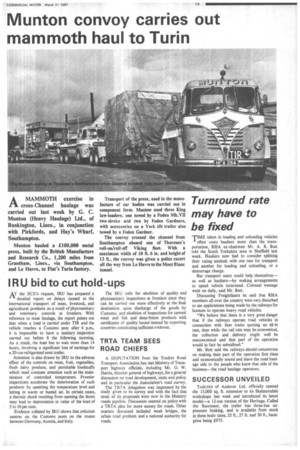IRU bid to cut hold-ups
Page 21

If you've noticed an error in this article please click here to report it so we can fix it.
AT the ECE's request, IRU has prepared a detailed report on delays caused to the international transport of meat, livestock, and agricultural products as a result of phytosanitary and veterinary controls at frontiers. With reference to meat haulage, the report points out that when a load is carried under TIR and the vehicle reaches a Customs post after 6 p.m., it is impossible to have a sanitary inspection carried out before 8 the following morning. As a result, the load has to wait more than 14 hours, involving a significant loss of earnings for a 20-ton refrigerated semi-trailer.
Attention is also drawn by IRU to the adverse effect of the controls on meat, fruit, vegetables, fresh dairy produce, and perishable foodstuffs which need constant attention such as the maintenance of controlled temperature. Frontier inspections accelerate the deterioration of such products by upsetting the temperature level and letting in warm or humid air. In certain cases, a thermic shock resulting from opening the doors may lead to depreciation in value of the load of 5 to 10 per cent.
Evidence collated by IRU shows that criticism centres on the Customs posts on the routes between Germany, Austria, and Italy. The IRU calls for abolition of quality and phytosanitary inspections at frontiers since they can be carried out more effectively at the final destination upon discharge of the goods by Customs; and abolition of inspections for canned meat and fish and deep-freeze products with certificates of quality issued instead by exporting countries constituting sufficient evidence.
















































































































